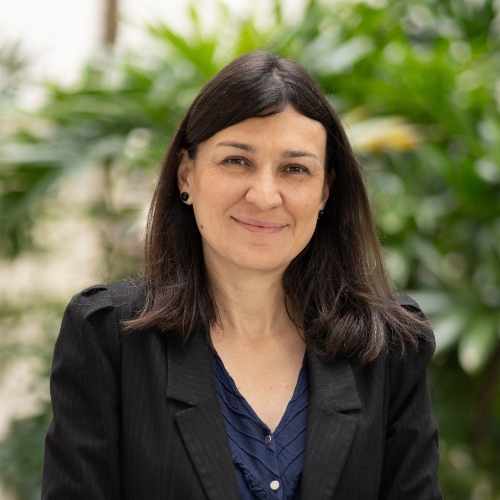Focus
Global mental health, brain health, translational neurosciences, social cognition, digital neuropsychology, community violence, and armed conflict.
Biography
Dr. Trujillo leads the Global Mental Health area in the Global Health Department at Stemple College of Public Health at FIU. During her career, she has focused on analyzing the impact of traumatic events related to armed conflict on mental health in diverse populations (e.g., illegal ex-combatants, victims, internal migrants/displaced, and the general population). She has conceptualized and proactively sought analytical and creative solutions to tackle mental health problems using the neurosciences frame. She has a remarkable capacity for working in multicultural scenarios and groups. Thus, Dr. Trujillo has successfully proposed a line of research incorporating the analysis of cognitive mechanisms among individuals exposed to armed conflict using basic and epidemiological methodologies. She has contributed to enlightening governmental reincorporation programs for illegal ex-combats in Colombia by contributing evidence-based strategies to translate the results into specific intervention actions. She has an effective rate of publications in armed conflict due to the novel electrophysiology approach to identify elements contributing to the assessment and cognitive-based interventions of individuals exposed.
She is a senior Atlantic Fellow for Equity in Brain Health and Global Atlantic Fellow, a prestigious training aiming to consolidate global strategies to advance the study of brain health. In this area, she has collaborated in a multidisciplinary initiative to characterize functional neural network reorganization among patients and their first-degree relatives with Parkinson’s and Alzheimer’s diseases. She has originally contributed to incorporating and interpreting the cognitive markers using experimental cognitive paradigms (potentially transferable to primary health care) synced with electroencephalography. She has collaborated to unveil the reorganization of electrophysiological networks associated with the memory binding in asymptomatic first-degree relatives with a causality mutation E280A in presenilin 1. She has also actively participated in an ongoing project to validate a tablet-based gamified version of a spatial navigation protocol and virtual reality. She is also involved in the transcultural validation of functional scales for AD follow-up.
She has successfully mentored undergrad during honor thesis, young researchers, and graduate students from basic biomedical sciences, neuropsychology/psychology, engineering, and epidemiology. Her interest as part of the Global Health Department is to evaluate the intersection and individual-to-society determinants of the exposure to impactful meteorological events and community violence on mental health outcomes. She expects to focus on immigrant populations across the lifespan from Latino/Hispanic communities living in the South and other Latin American communities, especially in Colombia. "
Research/Publications
https://scholar.google.com/citations?user=YdOSA1QAAAAJ&hl=en&oi=ao

